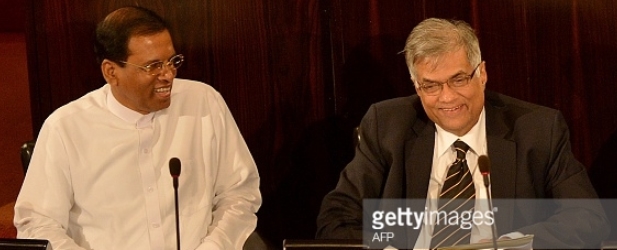( President Sirisena and Prime Minister Wickremesinghe)
(AFP) – Sri Lanka’s parliament voted overwhelmingly Tuesday to curb the power of the presidency, restoring a two-term limit and reviving independent bodies to manage key institutions such as the police and the judiciary.
A total of 215 out of the 225 lawmakers approved a constitutional amendment which restores presidential term limits, reversing a change by former strongman Mahinda Rajapakse who scrapped them after being re-elected in 2010.
The amendment was in line with a pledge by President Maithripala Sirisena. His election victory in January ended Rajapakse’s decade in power, during which he granted himself greater powers over the police, judiciary and civil servants.
Tuesday’s bill also removed the president’s power to dissolve parliament, until it has completed four and a half years of its five-year term.
Previously the president had the power to sack parliament after one year, a threat Rajapakse had used to keep lawmakers in line.
The amendment was watered down, however, to ensure that the minority government secured the support of the opposition, whose votes were crucial to gain a mandatory two-thirds majority. Sirisena’s government does not enjoy a majority in parliament.
The government agreed to accommodate four more legislators in a Constitutional Council which will make key appointments to run 11 public institutions such as the police, the judiciary, the elections office and the civil service.
“This is not ideal. We had to compromise because we don’t have a two-thirds majority on our own,” Prime Minister Ranil Wickremesinghe told parliament.
He said the government hoped to reduce the number of politicians in the Constitutional Council, which aims to depoliticise state institutions and ensure their independence.
Wickremesinghe described the statute amendment as an interim measure ahead of more democratic reforms.
“After the next election, we can have more reforms. We can turn the next parliament into a constituent assembly and adopt a (brand new) constitution,” the prime minister said.
The government did not say if parliament would be dissolved soon after passing the bill, in line with a pledge by Sirisena earlier this month.
The current parliament can run until April 2016, but Sirisena had said he would call fresh elections on April 23. He delayed the dissolution to give the opposition more time to pass the bill.
The government had initially planned to transfer many of the president’s executive powers to parliament and return the country to the Westminster-style parliamentary democracy that existed till 1978, but the Supreme Court shot it down.
The court ruled earlier this month that power can be transferred from the executive, who is elected directly by the people, to parliament only if approved by a referendum, which the government said was too expensive.
Instead, leaders agreed to clip the president’s powers and limit his immunity from prosecution.
In a rare address to the assembly on Monday at the start of a two-day debate on the reforms, Sirisena said the bill was a “meritorious act”.
He is expected to dissolve parliament soon and legislative elections could be held as early as June.
